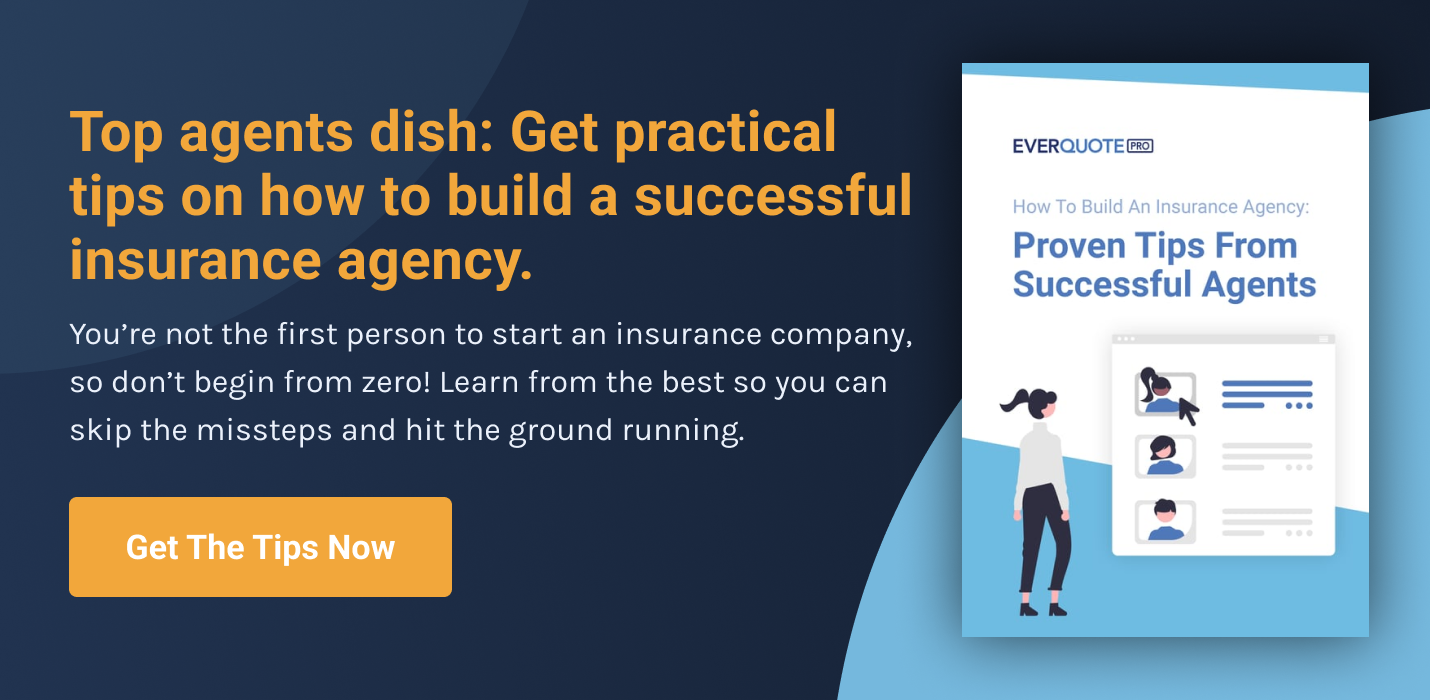- Home»
- EverQuote Pro Blog»
- Starting An Independent Insurance Agency With No Experience
Starting An Independent Insurance Agency With No Experience

Think starting an insurance agency is a big deal that requires a ton of time and money?
Well, surprise!
It’s not actually as hard as you think to start from scratch.
Even as an independent agent—one who does not work for a major carrier as a captive agent—you can forge your own path with little to no experience. Though you won’t have the “safety net” aspect that a captive carrier can offer, you will have the freedom to use your own savvy business sense to build your career as you see fit.
A lot of the things prospective agents think they “need” to do to be successful in kick-starting their agency dreams—finding an office space, hiring people, getting multiple licenses, etc.—actually don’t have to be done right away. Many of these things can all be done over time, as you continue to grow.
The truth is, starting an insurance business as a 1099 independent agent doesn’t require anything but yourself.
Once you’re appointed as an agent, you simply have to find out who you want to work for, get lead providers, decide how much you want to make, and then get to work. In this article, we’ll review the things you absolutely should do to get your insurance agency off the ground.
How To Start Your Own Independent Insurance Agency From Scratch: 11 Essential Steps
1. Get licensed in your state.
The first thing you’ll need to do if you want to start an insurance agency with limited resources is to get licensed in your state. That requires studying, registering, and taking the insurance exam for whatever type of insurance you’ll sell. We’ve detailed this process in our article, How To Pass The Life Insurance Exam: A Go-To Study Guide.
2. Get appointed with an independent carrier.
To get appointed, you need to have a business plan and be able to differentiate yourself. This is also a requirement for obtaining a business loan down the line, so it’s a good idea to iron out the details early on before you incur major expenses.
It also helps if you research different carriers you are interested in and make sure their business model and markets align with your specific circumstances. Specifically, you won’t be able to sell insurance for carriers that require agents to be captive.
3. Determine how you will get funded.
Starting an insurance agency with no experience means you’ll have to procure your own funding to get started. That may sound daunting—but it likely won’t require as much money as you think it will. Initially, the only necessities you’ll have to pay for include fees for licensing and testing and the cost of training and technology. If you have plans to grow your agency—or if you have a partner—you may be able to secure a more advantageous pay structure.
4. Decide where your agency will be located.
Gone are the days when foot traffic played a big role in the success of a new agent. Post-pandemic, it really no longer matters where your office is located. In some cases, you may not even need a dedicated office space. In my opinion, when you’re starting an agency with no experience, you don’t need an expensive office. Work from home or a coworking space until you are making enough money that having an office space actually supports your business instead of costing it.
5. Talk with someone who has experience doing what you want to do.
One of the keys to becoming successful as a new agent is taking the time to learn from others. I suggest, at minimum, seeking information from three sources:
- Your recruiter, who has experience in building a team, is one of the first people you should reach out to and learn from. Use their wisdom and experience to your advantage.
- Webinars and seminars hosted by successful agents. EverQuote hosts new agent-focused webinars weekly. They are free to attend and cover almost everything a new agent may be wondering about. You can also access EverQuote’s library of recorded past webinars absolutely free.
- Experienced agents you may have networked with in the process of becoming an agent.
As your agency grows and you attend more events and do more networking, you will continue to meet people who provide information that you can adapt and use in your own agency.
6. Don’t give up if it’s tough in the beginning.
The new insurance agent failure rate is around 50% (with one study citing 80%!)
One of the scary truths of selling insurance is that, in the beginning, the numbers are stacked against you in becoming a successful agent. Especially in your first year, you will find your profitability may be low and every day is a slog. This is absolutely normal, sadly—studies show the new insurance agent failure rate hovers around 50%.
Those are scary odds, but rest assured, the longer you’re in business, the easier it gets thanks to the “golden ticket” of insurance sales: renewals and commissions. However, it typically takes two or three years to reap these rewards. If you can grind it out for the first two years and work hard to establish a book, by year three you will find renewals are paying you for work you don’t have to do again.
Another note here: Learn as much as you can not only from agents who are succeeding, but also from those who have failed. In the case of the agents who have failed, find out (or figure out) what went wrong, and work backwards to avoid making the same choices if possible.
7. Sell auto and home insurance first.
I recommend getting licensed to sell auto and P&C insurance first for several reasons:
- These types of insurance are mandatory everywhere.
- The pool of potential customers is huge.
- They are easier to sell.
People are always looking to save money, and selling these insurance types is a very transactional business: If you can offer a better rate than a competitor, people are likely to buy from you. And because these types are easy to sell over the phone, new agents may find they can be successful only with telesales. That means you don’t have to worry about having a dedicated office space or going to someone’s residence to sell.
While life and health insurance both pay better than auto and home, it is more difficult to start with these policies because they’re truly optional for clients—auto and home are not. I recommend adding life and health to your sales pitch once you have clients who already trust you, because you will be adding options to multiline on existing policies instead of working from scratch to make a sale. If you can do this, your retention can increase significantly because no one wants to spend hours upon hours switching over all of their insurance policies.
8. Know your milestones for success.
I mentioned earlier that all agencies won’t be successful—in fact, most will fail. So how do you know when you’re growing and succeeding in your first year, even if you aren’t profitable yet? You’ll know through your milestones.
What are your milestones? These will vary based on your specific agency, but could include the following:
- Selling Your First Multi Line Policy
- Binding Your First 10 Households
- Hitting Your First $10,000/$20,000/$40,000 Premium Month
- Hiring Your First Team Member
- Closing Your First 100 Households
- Finishing Your First Year in Business With $XX in Premium Written
As you evaluate your milestones/goals, be brutally honest with yourself about the point at which you will exit this career. While I do suggest you give insurance a go—it is an amazing career that ultimately exists to help families!—you can’t fail forever. In your framework of goal setting, be clear about at which point you’re willing to exit insurance sales and try something new.
See also: What Do Insurance Agents Do Daily? A Day In The Life
9. When possible, hire experts with more experience than you.
Another key to building a successful agency is to surround yourself with people who are better than you at whatever task you’re assigning them to—and then letting them run with it.
As soon as you have the budget, my first suggested hire would be an office manager to run the administrative aspects of your office. This allows you to focus your time and effort on building your book and growing your business rather than on administrative tasks. I would next look to hire an assistant to help you dial, and then someone to help you recruit and write policies if needed. Yes, these are all cost centers, but if you want to grow and scale your business, you cannot spend your time doing all of these tasks. Delegate them to experts you’ve hired who can do them better than you can, so you can focus on your strengths.
10. Be coachable.
Finally, my last piece of advice for starting an insurance agency with no experience: Be coachable. If you think you know better than anyone else, you are in for a rude awakening. (See the stats in #6—your chances aren’t great!) As a new agent, be open to change and willing to learn from others around you, including other agents, mentors, and even office staff who have been “in the game” longer than you have. Similarly, don’t be afraid to test and try out different methods that may not have been done before. All of these things will either result in a. Success or b. Learning something valuable.
11. Fill up your pipeline with high intent prospects – especially when things are slow.
As a new agent, you may be wondering how to supplement your leads when you don’t have an existing book of business. My best advice:
Try EverQuote.
EverQuote is an online insurance marketplace that connects agents like you to consumers shopping for auto, home, and life insurance. The service includes advanced targeting and dedicated customer support, among other user benefits.
Whether you’re a new agent or a veteran, EverQuote gives you the flexibility and partnership you need to find success and grow your book of business. You’ll get expert help from our team, who can help you learn how to optimize your lead purchases and even provide support when you need to make adjustments. Click here to schedule a tour of EverQuote’s tools with one of our experts.
Unlock predictable growth with EverQuote.
Our representatives are standing by to help you succeed.
Call 844-707-8800
Weekdays, 9AM-5PM (ET)
Call 844-707-8800
Weekdays, 9AM-5PM (ET)
Accelerate your growth.
Complete the form below or just call 844-707-8800 to learn how we can help you achieve your goals.
By clicking "Get Started", I consent by electronic signature to being contacted by EverQuote, including by automatic telephone dialing and/or an artificial or prerecorded voice (including SMS and MMS - charges may apply), regarding EverQuote for Agents, even if my phone number is listed on a Do Not Call Registry. I also understand that my agreement to be contacted is not a condition of purchasing any goods or services, and that I may call (844) 707-8800 to speak with someone about EverQuote for Agents.
By clicking "Get Started", I affirm that I have read and agree to this website’s Privacy Policy and Terms of Use, including the arbitration provision and the E-SIGN Consent.
* Mandatory fields
 Product Overview
Product Overview Blog
Blog FAQs
FAQs Webinars
Webinars eBooks & Resources
eBooks & Resources